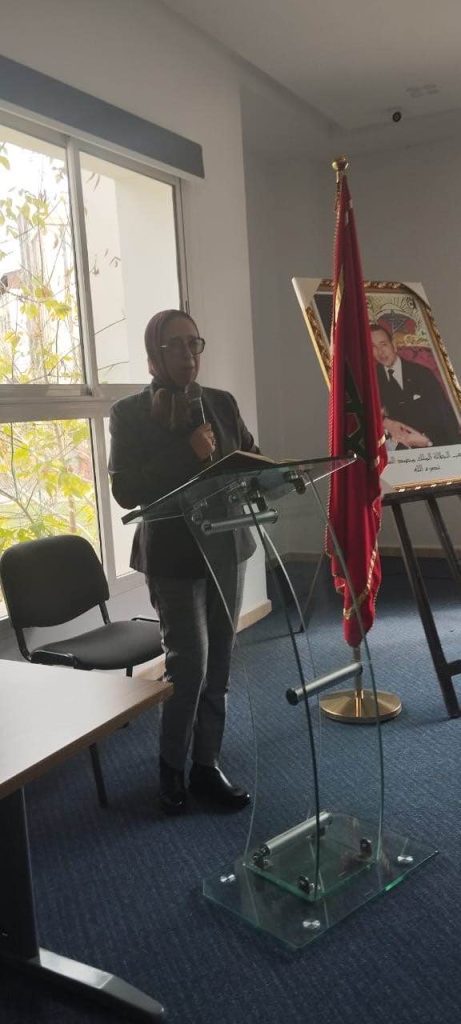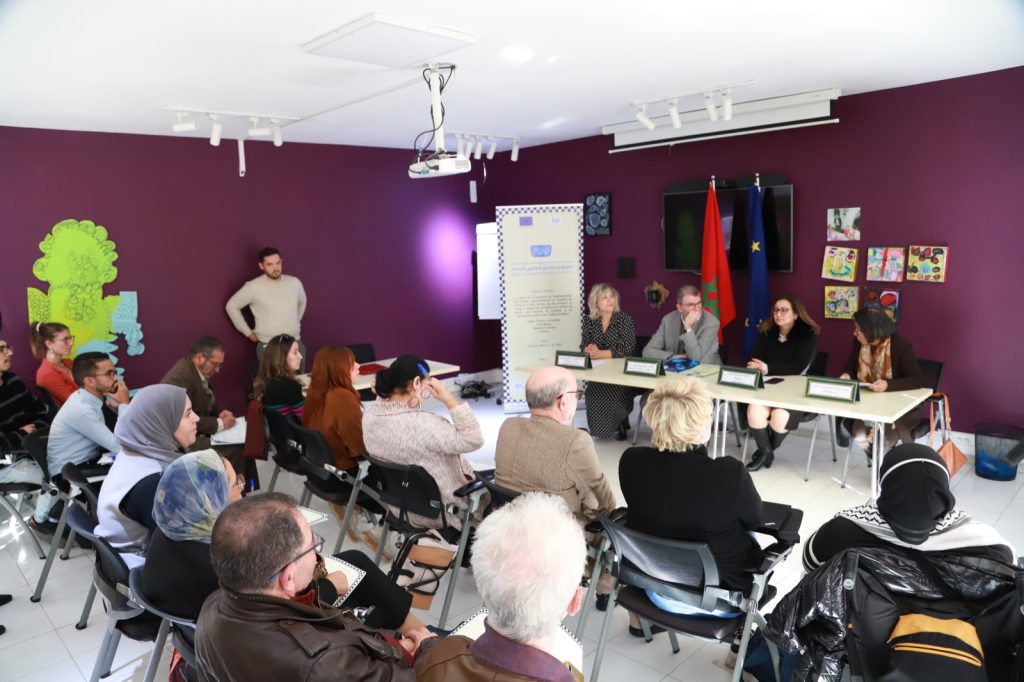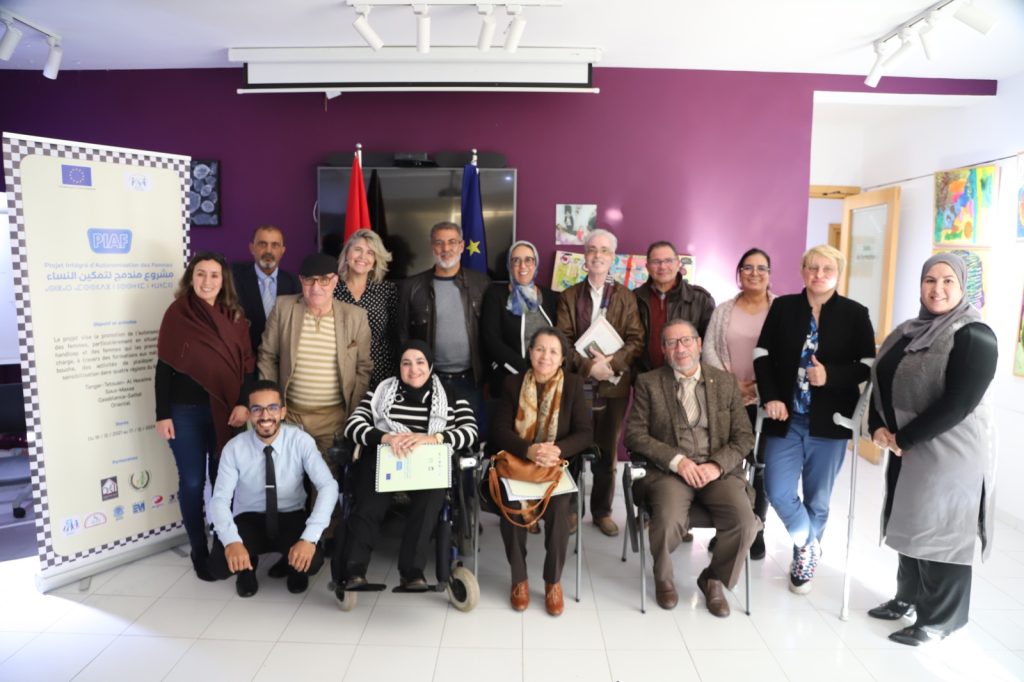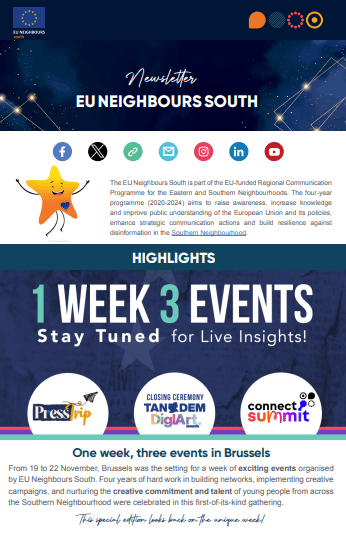Dr Mounia Hajji Zahar, President of the Achourouk Association in Tangier, has promoted support for blind and visually impaired people through education and innovative programmes. With the support of the EU-funded PIAF (Integrated Women’s Empowerment Project), Achourouk has launched a professional pastry programme that teaches participants culinary skills. PIAF’s training and financial support has improved the lives of girls with disabilities and their caregivers across Morocco through capacity building, civil society empowerment and disability awareness initiatives.

Achourouk Association: Innovative Support for the Blind and Visually Impaired
The Achourouk Association for the Support of the Education and Training Centre for the Blind and Visually Impaired, based in Tangier, supports Morocco’s largest centre for the support of people with visual impairments. The heart and soul of this organisation is Dr Mounia Hajji Zahar, a trained pharmacist who has been volunteering for civil society since 2000.
Her journey with Achourouk began in 2018 when she was invited, along with other experienced women from civil society, to contribute her expertise to the important work of the organisation. After serving as Secretary General, Mounia was elected President in 2020.
“We support blind and visually impaired people in their daily lives. We take care of education, teach languages and reading and writing in Braille, teach computer science and support them in obtaining diplomas through academic support courses,” says Mounia, summarising the association’s core activities. Under her leadership, Achourouk has undergone significant reorganisation and expansion. One of her notable achievements is the establishment of a kindergarten for blind and visually impaired children, which ensures early education and care for the youngest members of her community.
One particularly innovative initiative is the cookery workshop for blind and visually impaired people. “Normally, their relatives don’t allow blind and visually impaired people to stand alone in the kitchen, so we wanted to give them this opportunity and give them a sense of autonomy,” explains Mounia.
In addition to the cooking workshop, Achourouk offers a range of other programmes, including music workshops, physiotherapy, sports workshops and psychological support. “We help them to correct their posture, because non-sighted and visually impaired people walk inclined to find their way,” notes Mounia, emphasising the association’s holistic approach. The psychological support extends to both those affected and their families and covers an often underestimated need.

PIAF Boosts Achourouk’s Training Programs
The work of the organisation has taken a huge leap forward with the support of the EU-funded PIAF (Integrated Women’s Empowerment Project). “We had the chance to work with PIAF and our journey with them started with a very insightful training,” recalls Mounia.
“These training sessions gave us important guidance on how to write effective project proposals and secure funding.”
After this initial phase of capacity building, Achourouk received direct financial support from PIAF to organise the training programme. “PIAF basically started with capacity building for the association, followed by financial support,” emphasises Mounia. Thanks to this comprehensive support, Achourouk was able to propose and implement their current training project. “This is the first time we have received funding from an organisation other than the state, namely PIAF, and that is a big deal,” admits Mounia.
The initiative supported by PIAF is a professional pastry training programme for 12 blind and visually impaired people and their caregivers. The training programme covers various aspects of the culinary profession, from hygiene to the attitude of a chef. “Our participants are now in the final stage of preparing their own pastries,” says Mounia proudly. She has noticed a clear change in the participants. “I see a very big change. They are very proud of themselves. They are all dressed like chefs and that makes them so happy.”
By working with PIAF, the cooking workshop has evolved from a simple activity to a professional endeavour that provides a pathway to independence and possible employment. “PIAF has given our workshop a boost. In the beginning it was a simple cooking workshop, but with PIAF it became a path to independence for blind and visually impaired people, a professional activity, an empowerment,” emphasises Mounia.
A particular highlight of the project was a session led by a chef from a famous restaurant in Tangier. The participants were also invited to spend a day doing an internship in the restaurant’s kitchen, which gave them invaluable hands-on experience. In addition, a well-known pastry shop in Tangier opened its doors to offer internships to the Achourouk participants, further bridging the gap between education and professional opportunities.

Comprehensive Empowerment Effort: PIAF’s Multifaceted Approach
The EU co-financed project PIAF (Integrated Women’s Empowerment Project) aims to empower women, especially women with disabilities and their caregivers. This project, which runs from 2021 to 2024, focuses on training in various professions, advocacy and awareness-raising activities in four regions of Morocco: Tangier-Tetouan-Al Hoceima, Souss-Massa, Casablanca-Settat and Oriental.
The project targets a wide range of beneficiaries, including 200 girls with disabilities from the four regions and their caregivers, 100 institutional and associative actors involved in promoting the rights of women and people with disabilities, 50 professionals from the culinary management and catering sectors, 40 professionals from support centres for people with disabilities and at least 1,100 people from the general population.
Lamia Oussibrahim, who is responsible for training and supporting the PIAF associations, explains the project’s comprehensive approach. “Our project focuses on three main axes: capacity building for young girls and caregivers, strengthening civil society actors in project management and sensitising local business owners to the needs of people with disabilities,” Lamia summarises.
“In the training phase, 100 civil society actors in the four regions took part in a series of training sessions on communication, visibility, project management and results-oriented management,” explains Lamia. The aim was to equip these actors with the necessary skills to develop and promote initiatives that empower people with disabilities, such as workshops.
At the end of the first training phase, PIAF launched a call for projects, after which four initiatives were selected and funded, including Achourouk in Tangier. Each association received funding of 5,000 euros to get their workshops up and running. “The idea is to provide the necessary funds to initiate a workshop, to start an activity in the field of disability support,” says Lamia.
“Our aim is for the associations to embrace the idea of training for the disabled and integrate this topic horizontally into their work,” explains Lamia. This approach ensures that the empowerment of people with disabilities becomes a central aspect of all future initiatives of the associations involved.
The support provided by PIAF goes beyond mere financial aid. This holistic support system aims to provide associations with valuable expertise and enable them to integrate the disability dimension into all their projects and activities. “We support implementation, reporting, management, and visibility… it’s a learning process, the associations have acquired know-how for other projects,” emphasises Lamia.
A key component of the project is the results-based management system, a new approach for many associations in Morocco. Through this system, the associations learn to manage their projects more effectively and sustainably and to achieve a long-term impact
PIAF’s comprehensive support and innovative training have already led to impressive results. For example, Achourouk’s professional pastry training programme for blind and visually impaired people and their caregivers has not only provided participants with valuable culinary skills, but has also fostered a sense of independence and professional ambition. Through the collaboration with PIAF, the cookery workshop has evolved from a simple activity to a professional endeavour that opens up new avenues for integration into working life.

 Syria *
Syria * 


